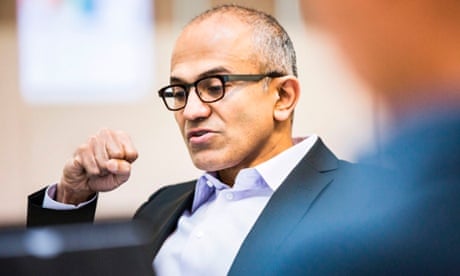Growing up near Washington DC, in the 1970s, one of my few pop cultural references for an Indian was Johnny Quest's Hadji: "a well-spoken … orphan who picked up his smarts on the streets of Calcutta." It was embarassing, like the urine-drinking Indian prime minister, or the teacher who explained to my classmates that the reason I was tardy in returning from a trip to India was because I "may have gotten married" at the ripe age of 10.
Indians take pride when one of their own scales the pinnacles of western success – Pulitzer Prizes, Miss America, governorships and business titans – partly because they are prickly about being viewed as the monkey-brain-eating other. Individual success is proof of the nation's collective intellect, work ethic and merit.
The selection of Satya Nadella as the new CEO of Microsoft is one such moment. Hyderabad-born, Indian-educated, cricket-lover, Nadella is pure Desi, bringing the essence of thousands of years of culture to cutting-edge technology. The reaction back home was ecstatic. The Hindustan Times crowed, "India raises toast as Satya Nadella named Microsoft top boss." Infosys CEO Narayana Murthy declared, "This is how India's brand will be enhanced." One analyst touted Nadella as an example for all Indians to put aside their "caste, religion and regional" differences and "start helping one another".
For Indians who do raise a glass of the national drink, Johnny Walker Black, to Nadella, they're not affirming a shared achievement. They're affirming their status in America's winner-take-all system. Their definition of success is limited to business executives, Hollywood stars, US attorneys, television physicians, and White House officials. This empty boosterism is often tinged by a chauvinism as crude as any Tea Party reactionary. Many Indian-Americans praise Bobby Jindal, the Republican governor of Louisiana solely for his heritage. If they paid attention to his policies he might have acquired the sobriquet of "Gunga Jindal" for seemingly changing his name and religion as part of his effort to pander to racists.
Ethnic pride also tends to be marked by childlike cravings for normalcy to mask shame. Each success is another sign India's greatness will erase images of a land of female infanticide, ethnic cleansing, gang rapes and slave labor. Now, what would be an accomplishment for these Indians is to mature beyond such dubious conceits. For one, what is there to celebrate in Microsoft? Many see it as a company with mediocre products wedded to Robber Baron monopoly practices headed by a billionaire whose pastimes include destroying public education from Kindergarten through college and bankrolling apocalyptic geoengineering schemes.
More significant, few of the 140 million Indians who lack clean water or the 400 million who live on less than $40 a month will toast Nadella. They are not indifferent to his success. They pay for it in homes bulldozed, waters stolen and land fouled by proliferating IT campuses and gated communities.
Exalting Nadella conflates the few with the nation. It's similar to the nationalist orgy after India exploded a nuclear device in May 1998. Arundhati Roy wrote at the time, "The bomb is India. India is the bomb. Not just India, Hindu India. Therefore, be warned, any criticism of it is not just anti-national, but anti-Hindu." Her critique exposed the double-edged sword of ethnic pride. After writing The God of Small Things, "beaming" Indians would stop Roy and declare, "You have made India proud," referring not to her novel that digs into India's afflictions of caste, class and gender violence, but to her receipt of England's Booker Prize. But that pride curdled. Her loyalty, background, and Indianness were questioned after she tallied that the embrace of nuclear weapons, "the most diabolical creation of western science," cost India freedom and imagination for fear and insecurity.
Since then nuclear terror has been superseded by India's embrace of the free market and the digital revolution. It's created 65 billionaires, but the cost is being borne by the still majority agrarian population who are being pushed off ancestral land for factories, mines and dams. So when Indians glow like a proud parent at a new CEO or billionaire of their own, they are rejecting millions who suffer for that wealth. If Indians want their own to venerate, they should look to those like Roy who embody the best of their heritage, the thirst for universal ideals and justice.
In the United States, there's Kshama Sawant, the new city councilmember in Seattle, around the corner from Microsoft's home, who's reviving socialism in a country floundering in capitalism. Or Bhairavi Desai, the unlikely organizer of tens of thousands of New York City cabdrivers. Or immigrant-rights organizer Harsha Walia in Canada.
In fact, there is an astonishing number of South Asians in North America whose activism is inspired by the vast tableau of social justice struggles in their home countries and communities. They are working across cultures, languages and communities for a better world, and are far more deserving of their compatriots' attention than some head of a corporate behemoth.
